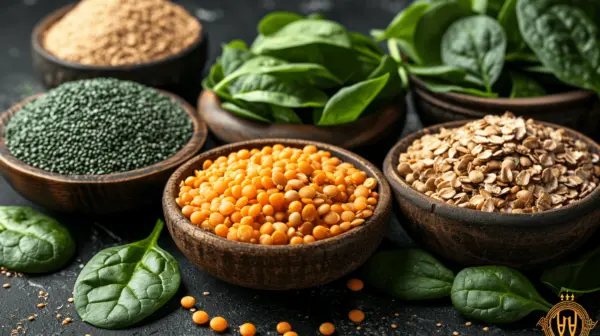Vitamin E
Why is Vitamin E Important?
Vitamin E is a powerful antioxidant that plays a crucial role in protecting cells from damage caused by free radicals. It helps maintain healthy skin, eyes, and immune function, and may also have anti-inflammatory effects. Additionally, Vitamin E supports cardiovascular health by preventing the oxidation of LDL cholesterol, which can lead to plaque buildup in the arteries.
What Happens if You Don’t Get Enough Vitamin E?
A deficiency in Vitamin E can lead to various health issues, including:
- Weakened Immune System: Vitamin E deficiency may impair immune function, making you more susceptible to infections.
- Neurological Problems: Some studies suggest that low Vitamin E levels may increase the risk of neurological disorders such as Alzheimer’s disease.
- Muscle Weakness: Vitamin E is important for muscle health, and a deficiency may lead to muscle weakness and fatigue.
- Vision Problems: Inadequate Vitamin E intake has been associated with an increased risk of vision problems, including cataracts and macular degeneration.
Why is Vitamin E Important for Athletes?
Athletes have higher antioxidant requirements due to increased oxidative stress from intense physical activity. Vitamin E helps protect against oxidative damage to muscles and other tissues, reducing inflammation and promoting faster recovery after workouts. Additionally, Vitamin E supports cardiovascular health, which is essential for maintaining endurance and overall athletic performance.
Where to Find Vitamin E?
You can incorporate Vitamin E into your diet by consuming the following foods:
- Nuts and Seeds: Almonds, sunflower seeds, and hazelnuts are rich sources of Vitamin E.
- Vegetable Oils: Olive oil, sunflower oil, and wheat germ oil are excellent sources of Vitamin E.
- Leafy Greens: Spinach, kale, and Swiss chard are packed with Vitamin E.
- Avocado: This creamy fruit contains Vitamin E and other essential nutrients.
- Fortified Foods: Many breakfast cereals, margarine, and other processed foods are fortified with Vitamin E.

Incorporating a variety of these foods into your diet can help ensure you meet your Vitamin E needs and support your overall health, especially if you’re an athlete
Should we take vitamin E daily?
Taking vitamin E daily can be beneficial for many people, as it is an essential nutrient that plays a role in immune function, skin health, and antioxidant activity. However, it’s important to consult with a healthcare provider to determine the appropriate dosage for individual needs.
What are the symptoms of low vitamin E?
Symptoms of low vitamin E include muscle weakness, vision problems, impaired immune function, and neurological issues such as loss of balance and coordination. Long-term deficiency can lead to more severe health problems.
Are bananas high in vitamin E?
Bananas are not particularly high in vitamin E. They contain small amounts, but other foods are much richer sources of this nutrient.
How do I get enough vitamin E?
To get enough vitamin E, include foods such as nuts, seeds, spinach, and broccoli in your diet. Fortified cereals and vegetable oils like sunflower, safflower, and wheat germ oil are also excellent sources.
Is there a downside to taking vitamin E?
There can be downsides to taking vitamin E supplements, especially in high doses. Potential risks include increased bleeding, nausea, diarrhea, stomach cramps, fatigue, and headache. High doses may also interfere with blood clotting.
What does vitamin E do to hair?
Vitamin E supports scalp health, which can contribute to hair growth and reduce oxidative stress. It helps to maintain a healthy scalp environment, which is essential for healthy hair.
What is the best form of vitamin E to take?
The best form of vitamin E to take is natural vitamin E (d-alpha-tocopherol) as it is more biologically active than the synthetic form (dl-alpha-tocopherol). Natural forms are typically better absorbed by the body.
How do I know if I need vitamin E?
You might need vitamin E if you experience symptoms of deficiency or have conditions that affect fat absorption, such as cystic fibrosis or Crohn’s disease. Blood tests can confirm vitamin E levels.
Which disease is caused due to deficiency of vitamin E?
Vitamin E deficiency can lead to a condition called ataxia, which affects coordination and balance. Other neurological problems can also arise due to a lack of this essential vitamin.
What depletes vitamin E in the body?
Factors that can deplete vitamin E in the body include smoking, exposure to pollution, poor dietary intake, and certain medical conditions that impair fat absorption, such as celiac disease or chronic pancreatitis.
Which fruit is rich in vitamin E?
Kiwifruit is relatively rich in vitamin E among fruits. Other fruits with good vitamin E content include mangoes and avocados.
What food has the highest vitamin E?
Nuts and seeds, particularly almonds and sunflower seeds, have the highest vitamin E content. Spinach and broccoli are also excellent sources, along with fortified cereals and vegetable oils.
What does vitamin E do for a woman?
For women, vitamin E supports skin health, hormonal balance, and may alleviate symptoms of PMS. It also has antioxidant properties that can protect against oxidative damage.
Is vitamin E good for grey hair?
Vitamin E may help with grey hair by improving circulation to the scalp and reducing oxidative stress. However, it is not a cure for grey hair, which is primarily caused by genetics and aging.
Does vitamin E increase facial hair in females?
There is no scientific evidence to suggest that vitamin E increases facial hair in females. Vitamin E primarily affects skin health and has antioxidant properties.
Is vitamin E good for thinning hair?
Yes, vitamin E can be beneficial for thinning hair. Its antioxidant properties help reduce oxidative stress on the scalp, potentially improving hair growth and preventing further hair loss.